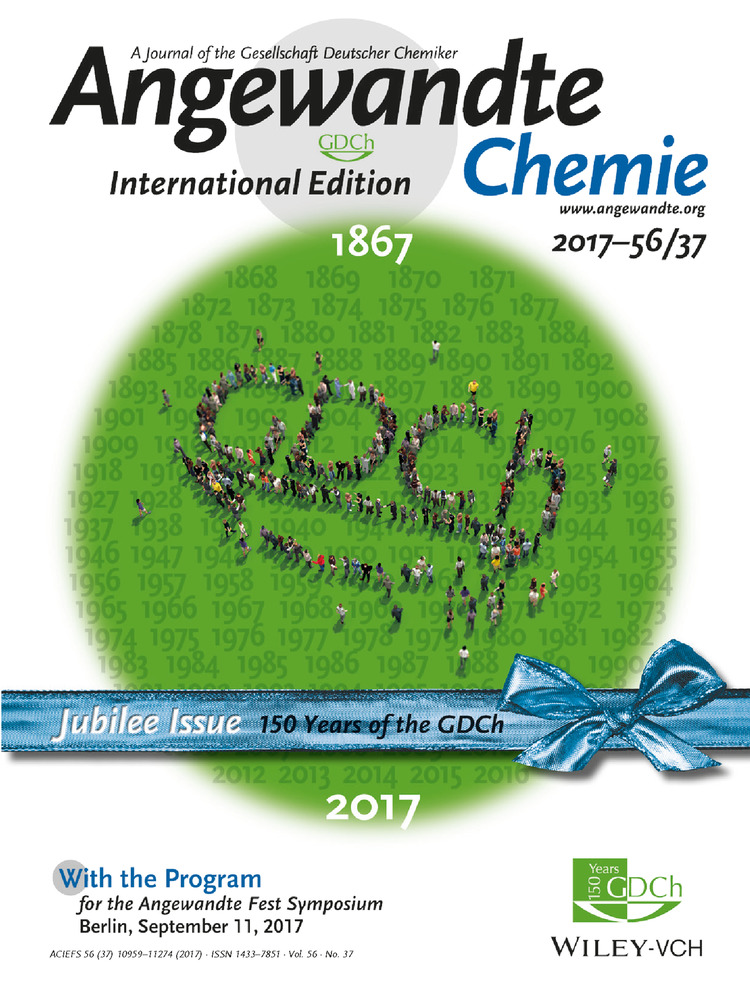Chemistry Has a Commitment to Life
Graphical Abstract
”… Science that only serves its own interests, that looks away when things get uncomfortable, or that surveys favored territories rather than boldly and curiously breaking new ground will endanger society's trust in the scientific search for truth. This is not a good perspective for a learned society. As a community with responsibilities and values, the GDCh must cultivate a culture that has the well-being of the entire population and the planet in mind …” Read more in the Editorial by Thisbe K. Lindhorst.
The Deutsche Chemische Gesellschaft (DChG) was founded in Berlin 150 years ago, on November 11, 1867. The DChG is the oldest of the predecessor organizations of the GDCh, which was formed after World War II. August Wilhelm Hofmann was the first President of the DChG, narrowly beating Adolf von Baeyer by only two votes. Hofmann had just returned from England, where he had been President of the London Chemical Society, which was founded in 1841. He significantly defined the start of the young and rapidly growing DChG. Jeffrey Johnson has outlined the rise and fall of the DChG and other German chemical societies in the historical context of the period from 1867 to 1945 in a Review that is published in this issue. At the end of World War II and after the downfall of Hitler’s murderous regine, the German chemical societies were morally ruined. The founding of the GDCh in 1949 therefore represented the start of a new era on an organisational level, however the rehabilitation of the society on an ethical level took longer. The GDCh has very recently confronted this difficult historical legacy and commissioned a detailed reappraisal of the involvement of the German chemical societies with the Nazi Regime. Thus in 2015 the 700-plus-page book Chemiker im Dritten Reich by historian Helmut Meier was published by Wiley-VCH. Furthermore, the inaugural Primo Levi Prize, which will be presented by the GDCh together with the Italian Chemical Society at the opening ceremony to mark the anniversary, is a sign that the GDCh is aware of its past and that it wants to build its future on the basis of steadfast values. Primo Levi, who the newly created honor is named after, was an Italian chemist and jew, who was deported by the Germans to a concentration camp near Auschwitz where he barely survived. Levi documented this period in numerous literary works and has saved these historical lessons from being forgotten. The Primo Levi Prize is awarded to honor scientists who are not only committed to chemistry, but are also particularly engaged in protecting human rights.
Long before World Wars I and II, which catapulted both Europe and the world into radically different times, the DChG was both liberal and international under Hofmann's leadership, even though this period was not particularly peaceful and was marked by nationalism. The prevailing view of the DChG was that science should rise above politics and national interests. In fact, in 1880 the DChG was not only the largest chemical society in the world but also had a significant international character, with 40 % of its members being from abroad. Although the Franco–Prussian War had taken place from 1870–1871, narrow-minded or hostile nationalistic mindsets were not found in the DChG. The value of scientific achievement, regardless from which country, was one of its guiding principles, and is of course a standard for us today.
The key factors that helped the rise of the DChG are today still a recipe for the success of chemical societies: they are open to everyone who is interested in chemistry, they have uncompromising standards of quality and scientific progress both in research institutes and industry, and naturally have outstanding publications. Other rules of the DChG are no longer up-to-date: today nobody finds an all-male society acceptable, and chemistry can no longer rise above politics as in Hofmann's day. Our subject has long been at the center of the political, economic, and ethical discussions of society as a whole. This is not surprising when we bear in mind the changes that have taken place over the last 150 years. Both chemistry and our whole world have become different. When the DChG was founded, it was still a matter of debate as to whether the structure of a molecule could ever be determined, whereas today we can make single molecules visible. The discoveries and products associated with chemistry have helped to bring people in all walks of life to a hitherto unknown degree of well-being. That said, our globalized world is facing unprecedented challenges that on one hand, we have brought upon ourselves, and on the other, we have to overcome ourselves. In 2015, with the publication of its strategy on sustainable development “17 Goals to Transform Our World”, the UN stated its core message: that future generations should not be worse off than us, but rather should be better off, and that the natural world that we live off should not be destroyed.
Can we use chemistry to lead to a better future for everyone? Can we as professional chemists work together with other experts to become architects for the future? Is there, bearing in mind our 150 years of history, an opportunity that a chemical society can take advantage of? Maybe so, as the future has a price that is related to the past. We can pay with what we did correctly, and with what we no longer want to do incorrectly. We can build our future on values that we have learned from history and what life demands from us. Chemistry must serve life and must not harm living beings on earth. Chemistry should not build walls but rather cross borders and encourage international cooperation. We must support creative thinking in chemistry and not just follow the mainstream—we should be open to the whole spectrum of questions to be answered and themes to be addressed. Chemical knowledge should be utilized so that it has positive effects. A requirement for this is an awareness about the consequences of our discoveries and creations, as well as a great deal of self-reflection. As chemists we thus have to think beyond experiments and keep in mind their eventual consequences. The future of chemistry depends on this being carried out with the same level of detail and thoroughness as the planning of experiments. In order to be aware of all these issues, “systems thinking” must become a part of our education in chemistry.
The term education sometimes appears to be out of fashion in a knowledge-based society, as if it belongs, so to speak, to the cultural past. In fact, education is indispensable in a society that is under pressure from the rising amount of available information and where the pace of everyday life has dramatically increased. In a world such as ours that changes so quickly, education allows the necessary orientation in life. This orientation is also a requirement for chemistry. Training in the field should be coupled with education, which helps us to apply knowledge. Education reminds us to not align our discipline with short-lived successes but rather with long-term general advances.
Science that only serves its own interests, that looks away when things get uncomfortable, or that surveys favored territories rather than boldly and curiously breaking new ground will endanger society's trust in the scientific search for truth. This is not a good perspective for a learned society. As a community with responsibilities and values, the GDCh must cultivate a culture that has the well-being of the entire population and the planet in mind. Its Code of Conduct, which appears first and foremost in its Statutes, is a pledge to this culture: chemistry has a commitment to our lives. The use of our knowledge in this spirit is the price for a thriving future and will also be our reward. Then something good will come from our history and we will have every reason to celebrate.






